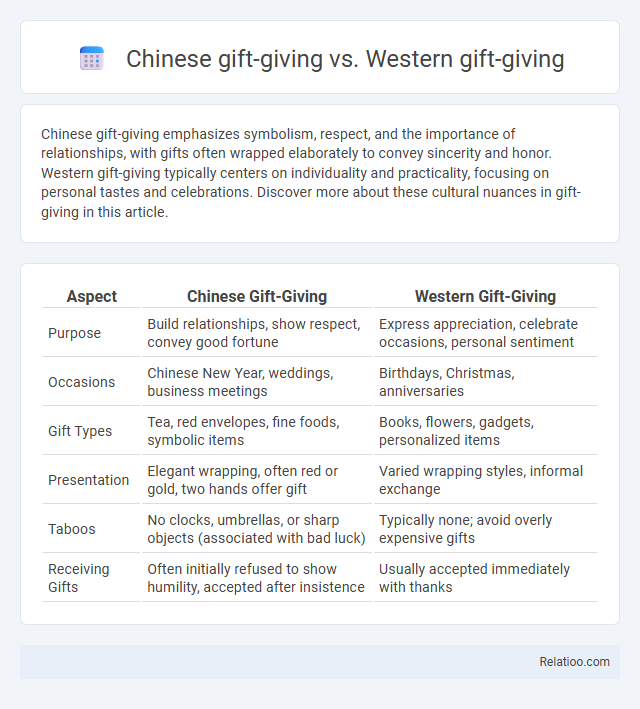Chinese gift-giving emphasizes symbolism, respect, and the importance of relationships, with gifts often wrapped elaborately to convey sincerity and honor. Western gift-giving typically centers on individuality and practicality, focusing on personal tastes and celebrations. Discover more about these cultural nuances in gift-giving in this article.
Table of Comparison
| Aspect | Chinese Gift-Giving | Western Gift-Giving |
|---|---|---|
| Purpose | Build relationships, show respect, convey good fortune | Express appreciation, celebrate occasions, personal sentiment |
| Occasions | Chinese New Year, weddings, business meetings | Birthdays, Christmas, anniversaries |
| Gift Types | Tea, red envelopes, fine foods, symbolic items | Books, flowers, gadgets, personalized items |
| Presentation | Elegant wrapping, often red or gold, two hands offer gift | Varied wrapping styles, informal exchange |
| Taboos | No clocks, umbrellas, or sharp objects (associated with bad luck) | Typically none; avoid overly expensive gifts |
| Receiving Gifts | Often initially refused to show humility, accepted after insistence | Usually accepted immediately with thanks |
Introduction to Gift-Giving Cultures
Gift-giving cultures vary significantly between Chinese and Western traditions, reflecting distinct social values and customs. In Chinese culture, giving gifts emphasizes respect, harmony, and the importance of relationships, often involving symbolic items and rituals, while Western gift-giving tends to focus on individual expression and personalization. Understanding these cultural nuances can help you navigate gift-giving occasions with sensitivity and appropriateness.
Historical Origins of Gift-Giving Traditions
Chinese gift-giving traditions have deep roots in Confucianism and ancient rituals emphasizing respect, hierarchy, and reciprocity, reflecting societal harmony and long-term relationships. Western gift-giving origins trace back to Roman Saturnalia and Christian customs, where gifts symbolized goodwill, celebration, and charity during festive seasons. Understanding your cultural context helps navigate the nuanced expressions of generosity and social bonding in diverse societies.
Symbolism and Meaning Behind Gifts
Chinese gift-giving emphasizes symbolism, where gifts often carry meanings tied to luck, prosperity, and respect, such as red envelopes symbolizing good fortune or clocks being avoided due to their association with death. Western gift-giving focuses more on personal expression and the celebration of special occasions, with gifts reflecting individual tastes and the nurturing of personal relationships. Gift-giving universally serves as a social tool to convey appreciation, strengthen bonds, and communicate unspoken sentiments, highlighting cultural nuances in symbolism and meaning.
Etiquette and Social Norms in Chinese Gift-Giving
Chinese gift-giving emphasizes respect, hierarchy, and reciprocity, with careful consideration of the recipient's status and the symbolic meaning of gifts, such as avoiding clocks or sharp objects that imply bad luck. In contrast, Western gift-giving often prioritizes personal taste and individual preference, with less focus on strict social protocols. Understanding Chinese gift etiquette, including presenting gifts with both hands and modestly refusing initially as a sign of politeness, is crucial for successful social and business interactions.
Etiquette and Social Norms in Western Gift-Giving
Western gift-giving etiquette emphasizes punctuality, thoughtful presentation, and appropriateness to the occasion, with gifts often reflecting the recipient's tastes and interests. Unlike Chinese gift-giving, which may involve symbolic items and intricate rituals, Western norms prioritize personal connection and practicality over formality. Your attention to these social nuances ensures respectful and meaningful exchanges that strengthen interpersonal bonds.
Gift Selection: Dos and Don’ts in China
Gift selection in China requires careful attention to cultural symbolism and taboos to avoid offense; you should avoid gifts in sets of four, as the number four is associated with death, and refrain from giving clocks or sharp objects, which imply severing relationships. High-quality tea, silk products, and items in red packaging are highly appreciated due to their positive connotations in Chinese culture. Compared to Western gift-giving, which often emphasizes personalization and practicality, Chinese gift-giving places greater importance on respect, auspiciousness, and the social hierarchy reflected in the choice and presentation of gifts.
Gift Selection: Dos and Don’ts in the West
Gift selection in Western cultures typically emphasizes personal taste and practicality, favoring items that reflect the recipient's hobbies or needs while avoiding overly expensive or intimate gifts to prevent discomfort. Dos include choosing high-quality, thoughtful presents such as books, gourmet food, or tech gadgets, whereas don'ts involve steering clear of gifts that symbolize bad luck, like sharp objects or clocks, and avoiding overly generic items lacking personal engagement. Understanding cultural nuances helps ensure the gift is well-received and strengthens social bonds without crossing boundaries.
Presentation and Wrapping Differences
Gift-giving in China emphasizes meticulous presentation, often using red and gold wrapping paper symbolizing luck and prosperity, while Western cultures commonly favor decorative ribbons, boxes, and holiday-themed wrapping. Chinese customs discourage gifts in white or black packaging, colors associated with mourning, contrasting with Western preferences that vary but often embrace seasonal or personal style in wrapping. Understanding these cultural differences can enhance Your appreciation of the symbolic meanings conveyed through the art of gift presentation around the world.
Occasions and Timing for Gift Exchange
Chinese gift-giving often revolves around traditional occasions such as Lunar New Year, weddings, and Mid-Autumn Festival, with timing typically aligned to auspicious dates based on the lunar calendar to ensure good fortune. In Western cultures, gift exchange occurs predominantly during Christmas, birthdays, and anniversaries, emphasizing personal milestones and holidays fixed to the Gregorian calendar. The timing of gift-giving in each culture reflects deep-rooted social customs, with Chinese practices highlighting collective harmony and symbolism, while Western customs focus more on individual celebration and spontaneity.
Impact of Globalization on Gift-Giving Practices
Globalization has significantly influenced gift-giving practices by blending traditional customs from diverse cultures such as Chinese and Western societies, fostering greater cultural exchange and adaptation. In Chinese gift-giving, emphasis on symbolism, respect, and hierarchy persists, while Western practices increasingly incorporate global trends like eco-friendly and experiential gifts. The convergence of these practices illustrates how globalization promotes both preservation and evolution of gift-giving rituals worldwide.

Infographic: Chinese gift-giving vs Western gift-giving
 relatioo.com
relatioo.com